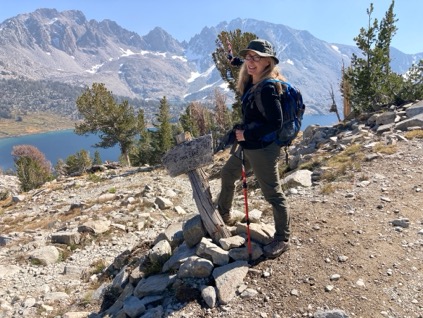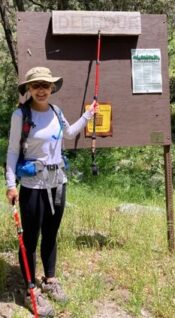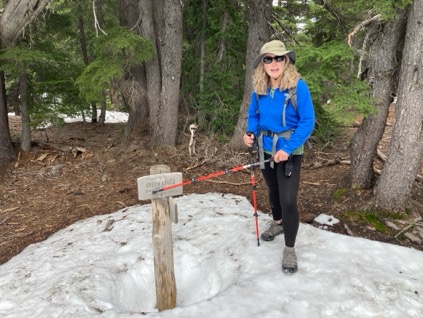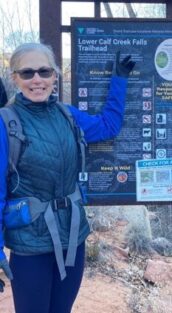June S. lives in La Crescenta, CA with her husband, 2 sons, and their dog, Rhylee, who is a constant companion. She is currently a part-time accountant, but has been a teacher for most of her career. She enjoys hiking, adventuring, visiting with family and friends, reading, and gardening.
My diagnosis
In November 2023, as a very healthy 57-year-old, I was diagnosed with stage 4 (IV) non-small cell lung cancer (NSCLC). This diagnosis came as an incredible shock to me as just 1 month prior, I was enjoying my annual excursion to Mammoth Lakes, CA, hiking at 10,000+ foot elevation for 8-10 miles daily with no issues.
The first sign that something was wrong occurred 2 weeks after that trip when I began to experience a strange pain that started at the base of my neck and went up the back of my head. Shortly after that, I started struggling with my balance and keyboarding skills. I’ve always focused on healthy living and exercising regularly, so these symptoms were very unlike me. Because of this, I decided to contact my primary care doctor.
I could not get an appointment right away, so I went to urgent care for testing and, hopefully, some answers. They took an X-ray of my neck, told me I had minor arthritis, and gave me muscle relaxers. I was completely misdiagnosed, and a few days later I ended up in the emergency room when I began vomiting, was weak, and couldn’t get up from the floor due to the pressure in my head.
The doctors in the emergency room ordered a CT scan that showed a mass on my brain. That was the cause of the symptoms I was having! I had brain surgery the following day, and 2 weeks later, I received the news that I had stage 4 (IV) NSCLC.
I could not believe it. I’ve never smoked, I lead a very healthy lifestyle, exercised daily, and had all the recommended cancer screenings. Lung issues run in my family, so I’ve always been very attuned to my lung health. I had no signs that anything was wrong with my lungs, not even a cough.
Treatment
I received biomarker testing, which showed that I had an EGFR mutation that could be treated with targeted therapy. I began targeted therapy in December. In January, I received brain radiation to treat 1 small additional tumor and the edges of the brain tissue where the original tumor was removed. I also elected to begin chemotherapy. I did this based on the promising results of a study that showed that targeted therapy with concurrent chemotherapy could lengthen remission. After the first 4, high-dose rounds, I am now on maintenance chemo every 3 weeks.
I’m happy to say, 8 months since diagnosis, I’m doing well and continue to enjoy my normal and busy life! Most days I feel like an imposter because I feel fine; it’s very hard to believe that I have this disease. As a good friend put it, “May you push this disease as far down the road as possible.” That’s my plan.
Screening
I can’t help but think about the fact that lung cancer screening could have changed my story. If screening had been available to me, my healthcare team may have caught it earlier and treated it before it had time to spread. Currently, the recommendation for lung screening includes only people who have a specific history of smoking. But we now know there are genetic links to lung cancer and, even more importantly, that anyone with lungs can get lung cancer. Advocating for expanding lung cancer screening criteria is something all of us can do to make a difference.
I also joined the INHERIT study because my mother died of metastatic lung cancer at age 38. My sons are also involved in the study. We will try to make a difference in our small way.
My perspective
If you have an opportunity to get screened for lung cancer with a low-dose CT scan, do it. Ask your doctor about getting screened. If you have free or low-cost mobile screening units in your area, take advantage of them.
Advocate for yourself. Trust that you know better than the experts when something is not right and push for more testing. I should have insisted upon more than an X-ray at urgent care; I should have made the staff really listen to the description of my symptoms and not send me away as they did.
Have a support system in place – even when you don’t need it. It’s amazing how people come together to help when something like this occurs. I’m eternally grateful to have a strong support network in my life.
Move. Eat well. I believe in doing your best to live a healthy lifestyle so when a battle comes, your body is ready to fight.





Leave A Comment